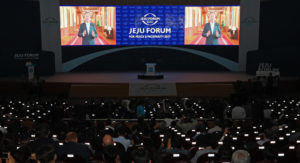Special to WorldTribune.com
 By Donald Kirk
By Donald Kirk
JEJU ― Gary Samore of the Belfer Center at Harvard, formerly with the Obama administration, suggested at the annual Jeju Forum for Peace and Prosperity that resolution of North Korea’s nukes-and-missiles program may be insoluble.
That sense weighs heavily on policy-makers in Seoul and Washington. How can Koreans and Americans agree on a common approach, and where is South Korea going in its alliance with the U.S.?
Americans and Koreans alike wondered how long the special U.S.-Korea relationship can endure despite the claims of U.S. Vice President Mike Pence, Defense Secretary Jim Mattis and Secretary of State Rex Tillerson during visits to Seoul that the U.S. and Korea are “in lockstep.”

Differences were all too clear in debate here on the unending standoff for power and influence in the region.
Chinese participants seemed far more concerned about the U.S. counter-missile battery known as THAAD than about North Korean missile tests.
Asked whether “the U.S. pivot to Asia” would “continue under the Trump administration,” Wang Dong of Peking University railed against the dangers of THAAD’s radar spying on Chinese forces. Speakers from Chinese institutes and universities all agreed: THAAD had to go or Korea would go on suffering retribution ― some would say, bullying.
Japanese military power was also on expert minds. Alexis Dudden, winding up a year at Yonsei, on leave from the University of Connecticut, saw Japan’s Prime Minister Shinzo Abe longing “to break Japan free” of Article 9 of Japan’s post-war constitution “against waging war abroad” ― a warning of the renaissance of Japanese militarism. She was hopeful, though, about Korea’s new president, Moon Jae-In, having “the real potential to ‘de-weaponize’ the region’s so-called history wars” ― that is, go beyond the desire for trying to avenge past misdeeds.
In the cacophony, uncertainty reigns as Moon fantasizes dialogue with North Korea.
U.S. President Donald Trump, by contrast, seems unable to decide what he would prefer ― sitting down with Kim Jong-Un for a hamburger or ordering a “preemptive strike” against the North’s nuclear and missile facilities.
Moon would doubtless like to persuade Kim to stop test-firing missiles long enough to be able to follow through on gestures toward reconciliation despite divisions among his newly appointed aides and ministers. His government has already approved missions to North Korea ― a modest prelude, perhaps, to resuming regular contacts on different levels.
Trump, meanwhile, is waiting to see if China’s President Xi Jinping can restrain North Korea. How far, however, will Xi want to go against the North while battling the imaginary danger of THAAD and defending China’s claim, fortified by expanding island bases, to the South China Sea? And how likely is Trump to take matters into his own hands with results that are difficult to anticipate?
North Korean missile tests so far have aroused only denunciations and stiffened sanctions, but the threat of a long-range intercontinental ballistic missile capable of carrying a nuclear warhead to the U.S. is deeply disturbing.
Seeing Kim Jong-Un defying China, might Trump decide now is the time to act?
This question is sure to test not only the historic Korea-U.S. alliance but an array of values and ties on multiple levels that bind the two in ways that defy precise definition.
Korean democracy, far from perfect, still comes much closer to the democratic ideal than almost any other nation for which Americans have fought and died since World War II.
The danger of reversion to historic colonialism and imperialism permeated the atmosphere here.
Haruki Wada of Tokyo University perceived “the legacies of colonialism” as a “vital problem of mankind.” Other than the usual “apology and persuasion,” however, he had no idea how to right the wrongs of Japanese rule ― notably exploitation of “comfort women.”
A sign of the futility of the Japanese approach was Wada’s view that “the problem of Dokdo-Takeshima,” as he called those two rocky islets in the East Sea, known to the Japanese as the Sea of Japan, “should be solved through diplomatic negotiations, finally.”
Oh sure. When I asked what was there to negotiate since the Koreans are not about to surrender Dokdo, he concluded where he had begun, that negotiations held the answer.
Such nonsense was overshadowed by reminders of the U.S. and Japan confronting China in a reversion to the bad old days even as North Korea brandishes its nuclear club. It was as though history was bound to repeat itself despite the camaraderie floating around the Jeju Forum.
Donald Kirk has been reporting on the confrontation of forces in the region for decades. He’s at [email protected].
